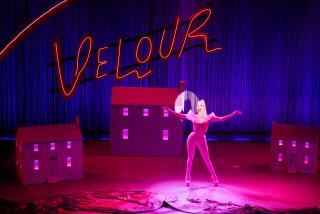Deborah Levy’s memoir asks: What if a woman is the main character in her own story?
“The suburb of femininity is not a good place to live,” Deborah Levy wrote in “Things I Don’t Want to Know” (2014), her shrewd response to George Orwell’s 1946 essay, “Why I Write.” In that first autobiographical manifesto, Levy addressed the challenges of finding her voice in a world “fathered by masculine consciousness.” After tracing her path from her 1960s childhood in South Africa — where she was traumatized by her father’s imprisonment for his anti-apartheid work in the African National Congress — to her family’s exile in England, she commented: “to become a writer, I had to learn to interrupt, to speak up, to speak a little louder, and then louder, and then to just speak in my own voice which is not loud at all.”
Levy’s voice may not be loud, but in the years since her marriage ended, it has become increasingly forthright and clear. Her literary career, which began in the 1980s writing plays, has blossomed; her two most recent novels — “Swimming Home” and “Hot Milk” — were both shortlisted for the Man Booker Prize. “The Cost of Living,” the second volume of her “working autobiography,” confirms that this is a writer who has found her voice and her subject, and both speak directly to our times.
In “Things I Don’t Want to Know,” Levy asked, “What do we do with knowledge that we cannot bear to live with?” One answer was to channel it into literature.
As Orson Welles told us, if we want a happy ending, it depends on where we stop the story.
— Deborah Levy
“The Cost of Living” is concerned with not just how to write, but how to live. Levy asks questions that evoke Sheila Heti’s semi-fictional novel, “How Should a Person Be?”: “What is a woman for? What should a woman be?” And more pointedly, what does it take for a woman to be the main character in her life?
For starters, it requires liberating yourself from trying “to please everyone all the time in a bid for approval, home, children and love.” Levy picks up her personal history shortly after the painful “shipwreck” of her 20-year marriage, when she moved with her two daughters from the family’s large Victorian home to a shabby rental apartment atop a North London hill.
Her decision to start afresh at age 50 was costly but worth the price: “Freedom is never free,” she writes. “When a woman has to find a new way of living and breaks from the societal story that has erased her name, she is expected to be viciously self-hating, crazed with suffering, tearful with remorse. These are the jewels reserved for her in the patriarchy’s crown. … but it is better to walk through the black and bluish darkness than reach for those worthless jewels.”
In Levy’s case, “the black and bluish darkness” includes struggles to pay bills and repair blocked pipes with previously unfamiliar gadgets — contributing to a general “anxiety of uncertainty.” But it also includes delight in a bare-bones writing shed provided by a friend, and the exhilaration of zipping between appointments on an electric bike.
Levy’s radar for sexism is acute. She chides close male friends who fail to refer to their wives by name, and flags the self-absorbed men she encounters at parties and on trains. Her deconstruction of a conversation overheard in a bar between a man and the young woman he’s trying to pick up is rich. The woman tells the man about an upsetting recent experience. “You talk a lot don’t you?” he responds. Levy’s assessment of their profound disconnect: “It had not occurred to him that she might not consider herself to be the minor character and him the major character.”
Levy’s literary touchstones and mentors in liberation include Simone de Beauvoir, Marguerite Duras, Doris Lessing, Virginia Woolf, Emily Dickinson and Adrienne Rich, and she knows how to wield a quote with the effectiveness of a pipe-clearing Master Plunger. Amid reflections on her recently deceased mother, with whom she had a choppy relationship, she notes that Duras maintained that “Our mothers always remain the strangest, craziest people we’ve ever met.” Beauvoir, she says, referred to Duras as a mother without “the fatal patience.” Discussing the unhappiness that preceded her separation, Levy writes that it “was starting to become a habit, in the way that Beckett described sorrow becoming ‘a thing you can keep adding to all your life … like a stamp or an egg collection.’”
Domesticity has taken some hard raps in recent British literature, including Rachel Cusk’s “Outline” trilogy and scathing memoirs on marriage and motherhood. “The Cost of Living” is a worthy addition to the genre.
Levy captivates us from her wonderful first sentence: “As Orson Welles told us, if we want a happy ending, it depends on where we stop the story.”
She begins and ends her story at just the right points, with plenty of astute observations in between. “When love starts to crack the night comes in,” she writes, a darker take on Leonard Cohen’s “Anthem” (“that’s how the light gets in”). Yet, while living without love may be temptingly risk-free, she comments, “What’s the point of that sort of life?”
If you want evidence that Levy’s struggles to find a life that makes sense for her have paid off, this book is Exhibit A.
McAlpin reviews books regularly for NPR, the Washington Post, the San Francisco Chronicle and The Times.
::
“The Cost of Living: A Working Autobiography”
Deborah Levy
Bloomsbury: 144 pp., $20
More to Read
Sign up for our Book Club newsletter
Get the latest news, events and more from the Los Angeles Times Book Club, and help us get L.A. reading and talking.
You may occasionally receive promotional content from the Los Angeles Times.







